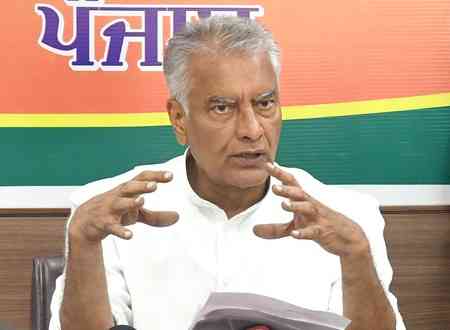Congress gave consent to deploy CISF to Union Government on December 2021: Barinder Kumar Goyal

Chandigarh, July 11, 2025: Punjab Water Resources Minister Barinder Kumar Goyal today presented a government resolution in the Punjab Vidhan Sabha opposing the Union Government's proposal for CISF deployment at BBMB installations in the state.
While presenting the resolution, Barinder Kumar Goyal stated that in recent years, the Government of India's Ministry of Power had sent a list of important BBMB installations that were not yet under CISF security and strongly stressed the need for CISF security coverage, stating that complete security should be provided to all important BBMB locations.
He said that Punjab has reconsidered the issue of CISF deployment and has registered strong objections against CISF deployment through letters sent to BBMB on May 27, 2025, and July 4, 2025. He stated that despite Punjab's strong objections, CISF is considering proceeding with the deployment. Even in the recent BBMB meeting held on July 4, 2025, Punjab strongly opposed the proposal.
He categorically stated that BBMB installations have been completely secured by Punjab Police for around 70 years. Even during very sensitive periods, no untoward incidents have ever occurred.
The Water Resources Minister said that the state police deployed at BBMB are well-acquainted with local conditions and have been serving these projects for many years. As far as technology is concerned, Punjab Police is proficient in using the latest technology. Besides this, Punjab Police has extensive experience in handling such situations in border areas. This force is as professional as any other force in the country, he added.
Barinder Kumar Goyal said that CISF deployment would impose an unnecessary financial burden on Punjab and other partner states. Punjab is the major contributor to BBMB expenses and therefore Punjab would have to bear this additional cost, said the cabinet minister, adding that the installations are within the territorial jurisdiction of Punjab and Himachal Pradesh. As per the law, the responsibility of maintaining law and order within their respective boundaries and ensuring security of these installations lies with the concerned state governments.
He said that according to recent proposals, the additional financial impact due to CISF deployment would be Rs.49.32 crore per year. He stated that Punjab is also managing other dams, including Ranjit Sagar Dam and Shahpurkandi Dam. The security of these dams is more critical than BBMB installations because these dams are very close to the international border. The security of these dams is being provided by Punjab Police and the state government.
The Cabinet Minister said that the cost of CISF hybrid model deployment is Rs.49.32 crore more than the current state police deployment, which is unacceptable. Punjab is a major stakeholder in the Bhakra Beas Management Board (BBMB) and makes significant contributions to its funding. Therefore, deploying CISF personnel at Bhakra Nangal and other hydro projects would impose an unnecessary and avoidable financial burden on the Punjab Government.
He said that if BBMB still intends to deploy CISF personnel, Punjab will not bear the cost of such deployment or any financial burden arising from it.
During the debate on the resolution, Sh. Goyal revealed that during the tenure of the previous Congress government, consent for CISF deployment was given to the Centre through a letter dated December 6, 2021.
"When Punjab Police is capable of securing the dams, then why is the Centre showing the need for CISF? Actually, this is about the Union Government's attempt to seize control of dams under the guise of deploying CISF," he added. He said that recently, the Union Government, in collusion with the Haryana Government, attempted to usurp Punjab's water rights, which was strongly opposed by the Chief Minister Bhagwant Singh Mann-led government. "When attempts were made to pressure the state, we went there and staged protests and protected our waters," he said.
He said that due to this, the Union Government is attempting to seize control of Punjab's dams indirectly by deploying CISF. He said that Punjab has sacrificed everything for the country, but the state has always been betrayed. Even during the Ravi-Beas water sharing in 1981, out of 17 MAF water, Punjab was allocated only 4 MAF water. Subsequently, the 13 paras of the Rajiv-Longowal Agreement of July 24, 1985, including one point stating that Chandigarh would be transferred to Punjab on January 26, 1986, were not implemented and no other point was acted upon, but only the provision to take away the state's water was implemented.
"Punjab needs 30 MAF water, but there is no water available for us," said Sh. Barinder Kumar Goyal, adding that the Chairman of BBMB is working on the Centre's directions. All work is being done at the behest of the Union Minister and former Chief Minister of Haryana, whereas he should treat the entire states equally.
Considering these aspects, the House unanimously rejected BBMB's proposal to deploy CISF personnel at all its installations. The House strongly stated that the currently deployed state police are well-acquainted with the location and security requirements of these projects, having served in these areas for many years. The existing arrangement has proven efficient and cost-effective, with no significant security deficiencies reported. Therefore, Punjab State does not agree with CISF deployment at the Bhakra Nangal Project.
The House unanimously recommended that the Punjab Government will raise this matter with the concerned ministries of the Government of India and inform the Government of India and BBMB that CISF personnel should not be deployed at Bhakra Dam projects and other hydro projects of BBMB.


 City Air News
City Air News 










